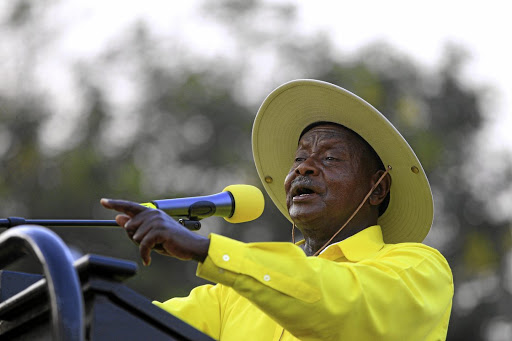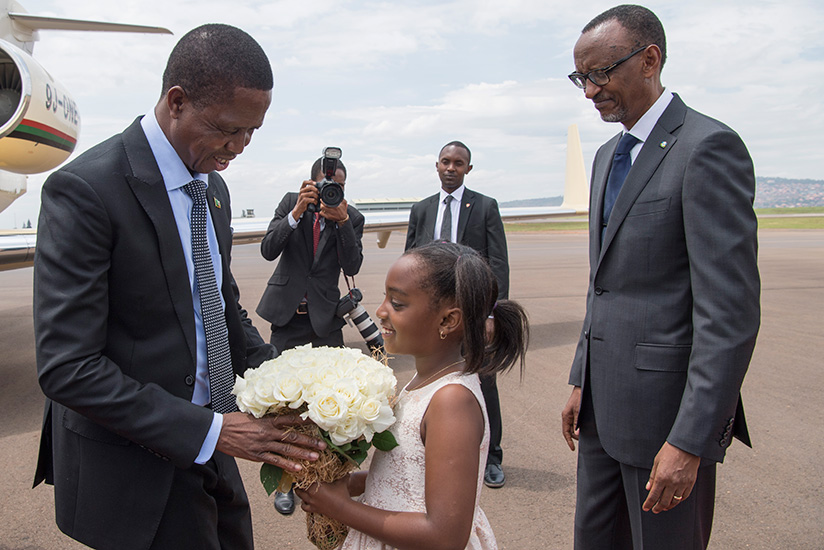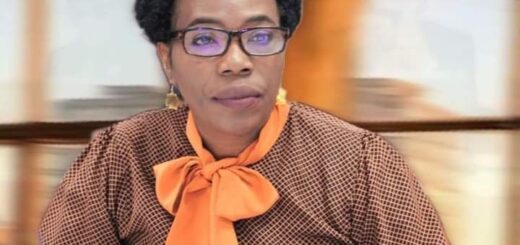WHO IS YOWERI KAGUTA MUSEVENI
Notice: Undefined index: catFilterList in /home/zambi/public_html/wp-content/plugins/wp-likes/api.php on line 243

Uganda’s President and the presidential candidate Yoweri Museveni of the ruling party National Resistance Movement (NRM) speaks during a campaign rally, ahead of the February 18 presidential elections, in Entebbe, Uganda February 10, 2016. REUTERS/James Akena – D1BESMGNGLAA
——

Dr. Edgar Ngoma is a Zambian Philosopher
“My mission is to provide factual information, thoroughly researched, and carefully curated to ensure accuracy, clarity, and balance, without promoting any particular agenda, bias, or prejudice.”
* Thursday 13th February 2025.
___
Yoweri Kaguta Museveni, the current President of Uganda, was born on September 15, 1944, in Ntungamo, Uganda, to a Banyankole family of cattle herders. His father, Amos Kaguta, and mother Esteri Kokundeka Nganzi raised him in a humble environment that would later shape his leadership skills.
Early education.
Museveni’s early education began at Kyamate Elementary School, followed by Mbarara High School and later Ntare School. During his high school years, he became a born-again Christian. His academic performance was impressive, and he developed strong leadership skills, serving as president of the debating society and scripture union.
After completing high school, Museveni attended the University of Dar es Salaam in Tanzania, where he studied political science and economics, graduating in 1970. This period played a significant role in shaping his political ideology, as he became involved with the University Students’ African Revolutionary Front (USARF).
Early leadership roles during school.
Yoweri Museveni’s leadership journey began early, with notable roles in school and university. At Ntare School, he served as President of the Debating Society and President of the Scripture Union. These positions helped shape his convictions and leadership skills.
During his time at the University of Dar es Salaam, Museveni became the President of the University Students’ African Revolutionary Front (USARF). This role exposed him to Pan-Africanism and anti-imperialism ideologies, further influencing his leadership style and political views.
Museveni’s academic achievements
Yoweri Museveni’s academic achievements are notable. He attended Kyamate Primary School, Mbarara High School, and Ntare School. Museveni then studied Political Science and economics at the University of Dar es Salaam in Tanzania, graduating in 1970.
The following are honorary doctorates conferred upon Yoweri Museveni:
– Doctor of Laws (LL.D.) from the University of Dar es Salaam
– Doctor of Literature (D.Litt.) from the University of Makerere
– Doctor of Humane Letters (DHL) from the University of the People
– Doctor of Philosophy (Ph.D.) from the University of the East
These honorary doctorates were conferred upon Museveni in recognition of his contributions to leadership, governance, and development in Uganda and Africa.
Military career
Museveni’s military career began in the 1970s, and he quickly rose through the ranks. He joined the Ugandan intelligence service in 1970 and later became a key figure in the Ugandan Bush War. In 1973, he formed the Front for National Salvation (FRONASA), a rebel group that aimed to overthrow the government of Idi Amin.
Museveni’s motivation for forming FRONASA was driven by his desire to bring an end to Amin’s brutal regime and restore democracy in Uganda. He believed in the importance of African unity and self-determination, and his experiences during this period shaped his leadership style and vision for Uganda’s future.
Museveni’s seizure of power and becomes president.
 In 1986, after a five-year liberation struggle, Museveni’s National Resistance Army (NRA) seized power from the government of Milton Obote, and he became the president of Uganda. Since then, he has been re-elected several times and has implemented various policies aimed at promoting economic growth, stability, and regional integration. Paul Kagame was one of his senior officer during the seizure of power and later in the Ugandan army Kagame was made head of military intelligence during which he acquired valuable experience which helped him to form his rebel group which stopped the Hutu led government genocide against the Tutsi minority ethnic tribe in Rwanda in 1994.
In 1986, after a five-year liberation struggle, Museveni’s National Resistance Army (NRA) seized power from the government of Milton Obote, and he became the president of Uganda. Since then, he has been re-elected several times and has implemented various policies aimed at promoting economic growth, stability, and regional integration. Paul Kagame was one of his senior officer during the seizure of power and later in the Ugandan army Kagame was made head of military intelligence during which he acquired valuable experience which helped him to form his rebel group which stopped the Hutu led government genocide against the Tutsi minority ethnic tribe in Rwanda in 1994.
Museveni’s personality and character
Yoweri Museveni’s personality and character are complex and multifaceted. On one hand, he is known for his strong leadership skills, which have been instrumental in bringing stability to Uganda after years of turmoil. His ability to connect with ordinary Ugandans and his commitment to African unity have earned him a reputation as a charismatic leader.
On the other hand, Museveni’s prolonged rule has been marked by allegations of authoritarianism and “human rights abuses.”” Critics argue that he has become increasingly autocratic, using his power to silence opposition and maintain his grip on power.
Museveni is also known for his “pragmatic approach to politics.” He has been willing to form alliances and make concessions to achieve his goals, as seen in his role in the Nairobi Agreement, where he helped broker a peace deal in Sudan.
Despite these criticisms, Museveni remains a highly influential figure in Ugandan politics, with a strong base of support among his constituents. His cunning and strategic thinking has allowed him to maintain power for over three decades, making him one of Africa’s longest-serving heads of state.
His style of leadership.
Yoweri Musevenis leadership style is a fascinating and complex topic. At its core, his approach to governance is centred around maintaining stability and security in Uganda. This focus has allowed the country to experience significant economic development and social progress over the years.
Museveni’s emphasis on stability and security is rooted in his belief that a safe and secure environment is essential for growth and development. He has invested heavily in Uganda’s security forces and implemented policies that promote stability, creating a foundation for economic growth and social development.
In addition to stability and security, Museveni has also prioritized economic development. He has implemented policies aimed at promoting investment, improving infrastructure, and reducing poverty levels. These efforts have transformed Uganda’s economy, making it one of the fastest-growing in Africa.
Another key aspect of Museveni’s leadership style is his ability to connect with ordinary Ugandans. He is known for his effective communication and engagement skills, which have helped him build trust and rapport with the population. By listening to their concerns and addressing their needs, Museveni has been able to maintain a strong connection with the people of Uganda.
However, Museveni’s leadership style has also been criticized for its authoritarian tendencies. His long tenure in power has led some to argue that he has become increasingly autocratic, suppressing political opposition and stifling freedom of speech. These criticisms highlight the complexities of governance and the need for leaders to balance their priorities with the need for democratic freedoms.
Overall, Museveni’s leadership style is multifaceted and reflects both his strengths and weaknesses as a leader. While he has made significant contributions to Uganda’s economic development and regional stability, his authoritarian tendencies and lack of political pluralism have raised concerns about the state of democracy and human rights in the country.
Zero tolerance on opposition political parties.
In Uganda, President Yoweri Museveni’s rule has been marked by a history of suppressing opposition leaders. One notable example is Kizza Besigye, a former ally of Museveni who has faced persecution and harassment for his opposition to the president’s rule. Besigye has been arrested multiple times and has experienced various forms of intimidation.
Another prominent opposition leader who has faced intense persecution is Bobi Wine, a popular musician-turned-politician. Wine’s rise to prominence has been met with brutal force by Museveni’s regime. He has been repeatedly arrested and beaten. His supporters have also been subjected to violent attacks, with reports of loss of life in riots across the country.
Besigye and Wine are not alone in their struggles. Other opposition leaders have also faced significant challenges under Museveni’s rule. Patrick Amuriat, a key opposition leader, has been involved in efforts to unite the opposition against Museveni. Mugisha Muntu, a former president of the Forum for Democratic Change (FDC), has been critical of Museveni’s government and has faced repercussions as a result. Mathias Mpuuga, the deputy president of the National Unity Platform (NUP), has also been critical of Museveni’s rule and has faced internal challenges within his own party.
Despite these challenges, these opposition leaders continue to push for democratic change in Uganda. Their efforts have not gone unnoticed, with discussions emerging about the possibility of uniting behind a single candidate to challenge Museveni’s rule in the 2026 elections.
The regime’s brutality extends beyond physical violence. Opposition figures and activists have been arbitrarily arrested, detained, and tortured in torture centres.” Testimonies from victims describe being subjected to electric shocks, beatings, and humiliating treatment.
Museveni’s reliance on violence to maintain power is rooted in his history as a guerrilla leader. He has consistently reminded Ugandans that he came to power through the gun and will stay in power by the same means. This mindset has created a culture of fear and intimidation, where opposition voices are systematically silenced.
The international community has taken notice of Museveni’s brutal suppression of opposition. The International Criminal Court has received complaints against Museveni and his son, Muhoozi Kainerugaba, alleging crimes against humanity. While the ICC has yet to decide on the case, the allegations highlight the urgent need for accountability and an end to Museveni’s reign of terror.
Throughout his presidency, Museveni has faced numerous challenges, including the HIV/AIDS epidemic, rebel insurgencies, and criticism from Western leaders regarding his democratic record. Nevertheless, he remains a key figure in Ugandan politics and a strong advocate for African unity and self-determination.
_Museveni’s strength and positive strides as president of Uganda and what he has achieved
_
On a positive note, Yoweri Museveni’s presidency in Uganda has been marked by significant achievements, notably his ability to maintain stability and security in the country. He successfully transitioned Uganda from a war-torn state to a model of relative stability in East Africa. Museveni’s economic reforms have been transformative, implementing structural adjustment programs that stabilized Uganda’s economy, leading to sustained economic growth. The country’s GDP has grown close to tenfold since 1986, and the GDP per capita has more than tripled.
Uganda’s economic growth under Museveni’s leadership has been remarkable. The country’s GDP grew from $3.92 billion in 1986 to $49.27 billion in 2023, with a growth rate of 5.23% in 2023. This growth has been driven by various sectors, including agriculture, industry, and services.
The country has made significant strides in GDP growth, with an average annual growth rate of 6-7% over the past two decades. Poverty has also decreased substantially, from 56.4% of the population in 1986 to 19.7% in 2019, and further to 41.3% in 2024. Infrastructure development has been impressive, with the total paved road network increasing from 1,000kms in 1986 to 5,500 km in 2019, and electricity generation growing from 150MW in 1986 to 1,254MW
Foreign Direct Investment (FDI) has also been on the rise, reaching $2.3 billion during the first nine months of FY24, driven by investments in the oil sector. Despite these achievements, Uganda still faces challenges, including a high poverty rate, limited job creation, and vulnerability to external shocks.
Looking ahead, the World Bank projects that Uganda’s economy will continue to grow, with a projected growth rate of 6.2% in FY25 and 10.8% in FY26, driven by oil production and a recovery in tourism. The government aims to expand the economy tenfold to $500 billion within a decade, starting FY 2024/2025, driven by value addition and access to export markets.
In addition to his domestic achievements, Museveni has played a crucial role in promoting regional peace and stability, particularly in neighbouring countries such as South Sudan, the Democratic Republic of Congo, and Somalia. He has been a strong advocate for African unity and self-reliance, stressing the need for African countries to work together to solve their problems.
Overall, Museveni’s leadership has had a significant impact on Uganda’s development, and his commitment to regional peace and stability has made him a respected statesman in Africa.
How will the world remember General Museveni?
Yoweri Museveni’s legacy is complex and multifaceted. On one hand, he is credited with bringing stability and security to Uganda, transforming it from a war-torn state to a model of relative stability in East Africa. His economic reforms have also been instrumental in revitalizing the economy, with Uganda experiencing sustained economic growth over the years.
Museveni’s commitment to regional peace and stability has been notable, particularly in neighbouring countries such as South Sudan, the Democratic Republic of Congo, and Somalia. His advocacy for African unity and self-reliance has made him a symbol of Pan-Africanism, and his influence extends far beyond Uganda’s borders.
In terms of domestic achievements, Museveni’s legacy includes the restoration of peace and security within Uganda’s borders, the creation of a professional people’s army, and political stability. He has also made significant strides in sectors like healthcare, education, and economic development ⁵.
However, it’s worth noting that Museveni’s long tenure has also raised questions about democratic governance and the transition of power. Despite this, his supporters argue that his continued leadership has been crucial to maintaining stability and ensuring progress.
Overall, the world will likely remember Museveni as a transformative leader who brought stability and economic growth to Uganda while also promoting regional peace and African unity.
About the Author
Prof. Edgar Ngoma is a renowned philosopher and distinguished governance expert with a wealth of experience in promoting good governance in Zambia. His career is marked by remarkable achievements, including serving as a private consultant on good governance to four out of the seven heads of state in Zambia. This testament to his expertise has enabled him to lobby African leaders to transform the continent through innovative initiatives.
Prof. Ngoma has demonstrated a commitment to promoting good governance, transparency, and accountability in Zambia and beyond. His expertise has been sought by various stakeholders, including governments, international organizations, and civil society groups. As a private consultant, he has provided strategic guidance on policy formulation, institutional reform, and leadership development, helping shape Zambia’s development trajectory.
Prof. Ngoma has by now written biographies on Kagame, Tshisekedi, and Ramaphosa. His writings and teachings have inspired a new generation of leaders and governance practitioners in Zambia and beyond. His legacy continues to shape the governance landscape in Africa, and his contributions to the field of governance will be remembered for years to come. Watch out the next biography is on the only female president in Africa, Mama Samia Suluhu Hassan, the president of Tanzania.
Photo: Yoweri Kaguta Museveni and Janet Museveni with their first two children, Natasha and Muhoozi in Tanzania in 1977.
END//























